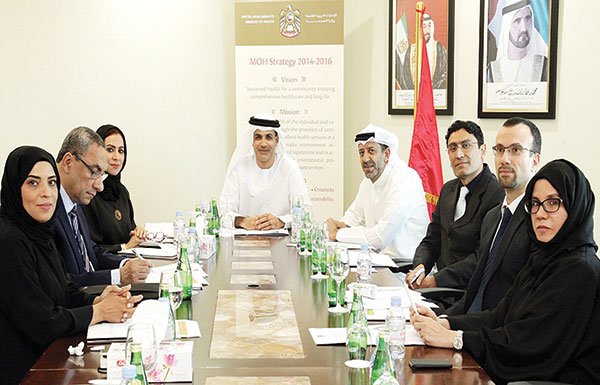H.E. Abdul Rahman Al Owais,the UAE Minister of Health and Prevention, has issued theresolutionon the formation of the National Committee forSupervising the UAE Human Genome Project, chaired by Dr. Mohammed Yousuf Al Serkal, the Assistant Undersecretary for hospitals, UAE Ministry of Health and Prevention.
Committee membership includes Dr. Mahmoud Taleb Al Ali, the Director of the Centre for Arab Genomic Studies (CAGS), a division of the Sheikh Hamdan Bin Rashid Al Maktoum Award for Medical Sciences (HMA), Dr. Abdul RezzakHamzeh, the Senior Scientific Coordinator of CAGS, alongside with a group of experts and specialists in geneticsfrom local institutions including the Faculty of Medicine, UAE University, Khalifa University of Science, Technology and research, the UAE Council of scientists, and Latifa Hospital.
Dr. Mahmoud Taleb Al Ali, the Vice Chairman of the Committee, and the Director of CAGSsaid: "By 2020, the UAE Human Genome Projectis scheduled to be completed. The aim of the project is to elucidate the genetic background of Emiratis as a prelude to the application of the personal medicine within the UAE".
“Within the project, technical, administrative and financial workingsubgroups will be formed. Also, a center affiliated to the UAE Ministry of Healthwill be established and equipped with specialized cadres and scholars in this field of science”.
Dr. Al Ali pointed out to the establishment of a database for the UAE genome, which will take advantage of the already existing CAGS’CTGA database, in which around 323genetic disorders and 136 of their related genes were reported in UAE.
“A «Reference registry» for genetic diseases in the UAE will be developed, focusing in its beginning on the most prevalent Non-Communicable Diseases such as Diabetes, High Blood Pressure, Cancers, and Asthma”, Dr.Al Ali added.
“Also, a comprehensive genetic survey will be conducted aiming at finding the most effective therapy for each patient, predicting probable future diseases, and therefore taking the required preventive measures against them”, he said.

